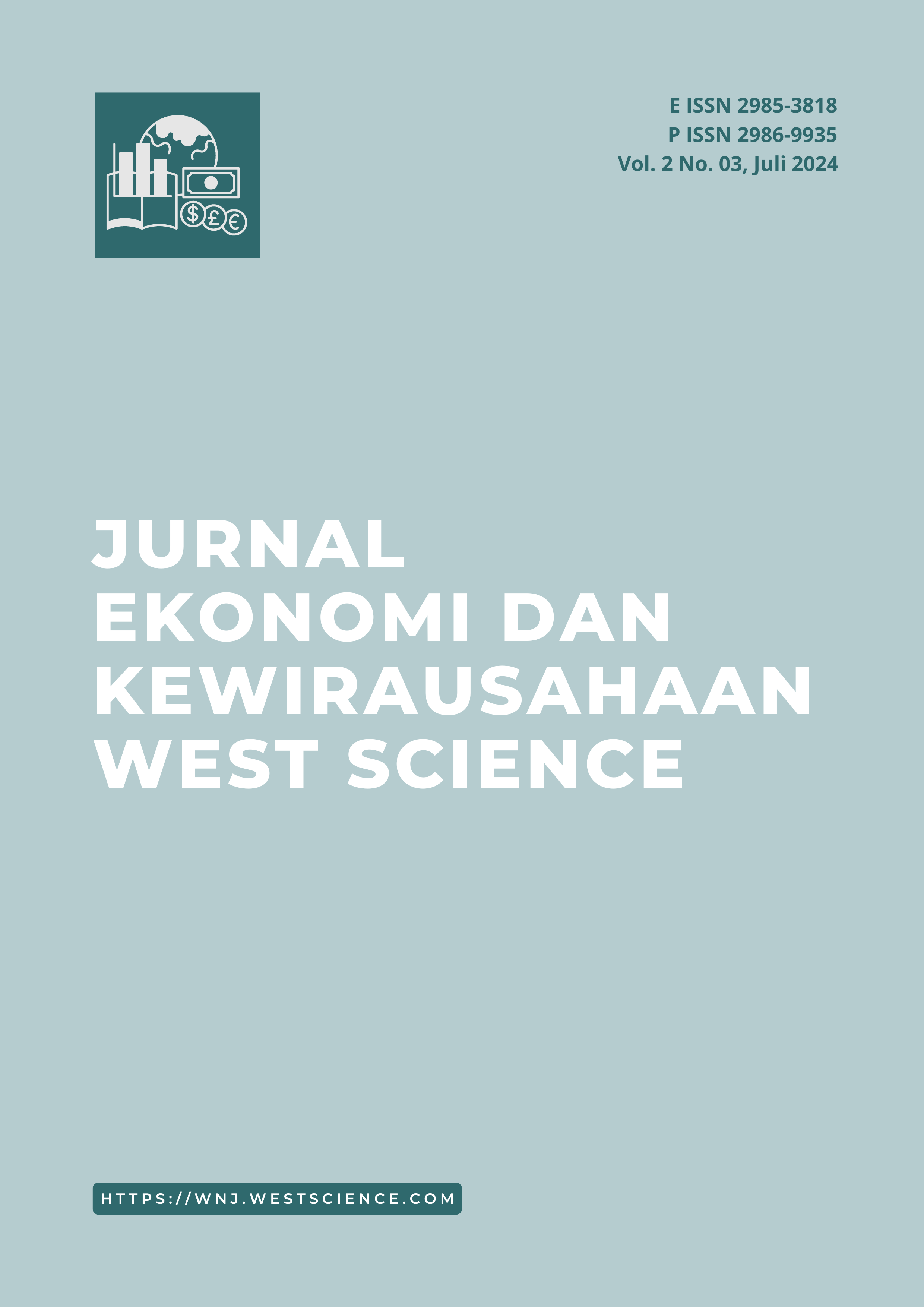Kontribusi Akademik dalam Pengembangan Literasi Keuangan Digital
DOI:
https://doi.org/10.58812/jekws.v2i03.1432Kata Kunci:
Literasi Keuangan Digital, Inklusi Keuangan, Teknologi Keuangan, Analisis Bibliometrik, VOSviewerAbstrak
Penelitian ini mengeksplorasi tema-tema utama, tren penelitian, potensi penelitian, dan jaringan kolaborasi penulis dalam literasi keuangan digital menggunakan analisis bibliometrik. Melalui analisis klasterisasi, ditemukan bahwa topik literasi keuangan, inklusi keuangan, dan keuangan digital merupakan tema sentral yang banyak diteliti, sementara topik seperti alat digital, literasi keuangan Islam, dan gender masih jarang diperhatikan. Tren penelitian menunjukkan pergeseran fokus dari topik umum ke aplikasi praktis teknologi keuangan dalam beberapa tahun terakhir. Jaringan kolaborasi penulis menunjukkan pola kolaborasi yang terbatas dalam kelompok kecil, dengan sedikit interaksi lintas kluster. Kesimpulannya, penelitian lebih lanjut yang mengeksplorasi topik kurang terjamah dan meningkatkan kolaborasi lintas kelompok dapat memperkaya literatur dan memberikan wawasan yang lebih komprehensif serta inovatif dalam literasi keuangan digital.
Referensi
Amagir, A., Groot, W., Maassenvandenbrink, H., & Wilschut, A. (2017). A review of financial-literacy education programs for children and adolescents. Citizenship, Social and Economic Education, 17. https://doi.org/10.1177/2047173417719555
Auld, E., Rappleye, J., & Morris, P. (2018). PISA For development: how the OECD and World Bank shaped education governance post-2015. Comparative Education, 55, 1–23. https://doi.org/10.1080/03050068.2018.1538635
Azaria, C., & Noviani, L. (2024). Navigating Global Cyberspace: An Extensive Bibliometric Journey through Digital Financial Literacy and Accounting Research. East Asian Journal of Multidisciplinary Research, 3(4), 1589–1606.
Azzopardi, E., & Nash, R. (2013). A Critical Evaluation of Importance–Performance Analysis. Tourism Management, 35, 222–233. https://doi.org/10.1016/j.tourman.2012.07.007
Brika, S. K. M. (2022). A bibliometric analysis of fintech trends and digital finance. Frontiers in Environmental Science, 9, 796495.
Dahmen, P., & Rodríguez, E. (2014). Financial Literacy and the Success of Small Businesses: An Observation from a Small Business Development Center. Numeracy, 7. https://doi.org/10.5038/1936-4660.7.1.3
de Bassa Scheresberg, C. (2013). Financial Literacy and Financial Behavior among Young Adults: Evidence and Implications. Numeracy, 6. https://doi.org/10.5038/1936-4660.6.2.5
Fernandes, D., Lynch, J., & Netemeyer, R. (2014). Financial Literacy, Financial Education, and Downstream Financial Behaviors. Management Science. https://doi.org/10.1287/mnsc.2013.1849
Goel, I. (2024). FINANCIAL EDUCATION AND DIGITALISATION: ANALYSIS OF AVENUES. Sachetas, 3(1), 17–25.
Goyal, K., & Kumar, S. (2021). Financial literacy: A systematic review and bibliometric analysis. International Journal of Consumer Studies, 45(1), 80–105.
Klapper, L., & Lusardi, A. (2020). Financial literacy and financial resilience: Evidence from around the world. Financial Management, 49(3), 589–614.
Koskelainen, T., Kalmi, P., Scornavacca, E., & Vartiainen, T. (2023). Financial literacy in the digital age – A research agenda. Journal of Consumer Affairs, 57. https://doi.org/10.1111/joca.12510
Li, J., Wu, Y., & Xiao, J. J. (2020). The impact of digital finance on household consumption: Evidence from China. Economic Modelling, 86, 317–326.
Lusardi, A. (2019). Financial literacy and the need for financial education: evidence and implications. Swiss Journal of Economics and Statistics, 155, 1. https://doi.org/10.1186/s41937-019-0027-5
Lusardi, A., & Mitchell, O. (2013). The Economic Importance of Financial Literacy: Theory and Evidence. Journal of Economic Literature, 52. https://doi.org/10.2139/ssrn.2243635
Millaningtyas, R., Amin, M., Hermawan, A., & Handayati, P. (2024). Digital Transformation of Financial Literacy and Inclusion as a Support for Convenience for MSMEs. International Journal Of Humanities Education and Social Sciences, 3(5).
Mitchell, O., & Lusardi, A. (2011). Financial Literacy Around the World: An Overview. Journal of Pension Economics and Finance, 10, 497–508. https://doi.org/10.2139/ssrn.1810551
Philippon, T. (2019). The FinTech Opportunity (pp. 190–218). https://doi.org/10.1093/oso/9780198845553.003.0011
PRICOPOAIA, O., CRISTACHE, N., STOICA, D., CHIHAIA, A.-S., & MURARIU, S. (2024). Analysis of the Impact of the Phenomenon of Digitization of Organizations – a Bibliometric Approach To the Specialized Literature. November, 363–377. https://doi.org/10.24818/imc/2023/02.14
Prykaziuk, N., & Khodakivska, Y. (2023). DIGITAL FINANCIAL LITERACY: COMPONENTS AND METHODS OF ENHANCEMENT. Innovation and Sustainability, 31–37. https://doi.org/10.31649/ins.2023.2.31.37
Quelhas, A. P., Clímaco, I. N., & Larguinho, M. (2023). Exploratory Analysis of Financial Literacy and Digital Financial Literacy: Portuguese Case. In Marketing and Smart Technologies: Proceedings of ICMarkTech 2022, Volume 2 (pp. 697–707). Springer.
Rahayu, R., Ali, S., Aulia, A., & Hidayah, R. (2022). The current digital financial literacy and financial behavior in Indonesian millennial generation. Journal of Accounting and Investment, 23(1), 78–94.
Saputro, N., Purnama, M. Y. I., Nugroho, L. I., Toro, M. J. S., Pamungkas, P., Prameswari, A. P., & Trinugroho, I. (2023). Literasi Keuangan Digital untuk mendorong Wirausaha Berbasis Digital. Manajemen Dewantara, 7(1), 46–51.
Servon, L., & KAESTNER, R. (2008). Consumer Financial Literacy and the Impact of Online Banking on the Financial Behavior of Lower‐Income Bank Customers. Journal of Consumer Affairs, 42, 271–305. https://doi.org/10.1111/j.1745-6606.2008.00108.x
Shapovalova, A., & Munister, V. (2022). Financial literacy and its multi-factory model in conditions of digital economic transformation. Vestnik NSUEM, 102–119. https://doi.org/10.34020/2073-6495-2022-2-102-119
Sobolieva-Tereshchenko, O., & Zharnikova, V. (2022). Current state and prospects for the development of Digital financial literacy in Ukraine. VUZF Review, 7(2), 205.
Thakor, A. (2019). Fintech and banking: What do we know? Journal of Financial Intermediation, 41, 100833. https://doi.org/10.1016/j.jfi.2019.100833
Yuneline, M. H., & Rosanti, M. F. C. (2023). The Role of Digital Finance, Financial Literacy, and Lifestyle on Financial Behaviour. HOLISTICA–Journal of Business and Public Administration, 14(2), 97–115.
Unduhan
Diterbitkan
Cara Mengutip
Terbitan
Bagian
Lisensi
Hak Cipta (c) 2024 Loso Judijanto, La Ode Rasidun, Nurlina Aris

Artikel ini berlisensiCreative Commons Attribution-ShareAlike 4.0 International License.



















 Instagram
Instagram 